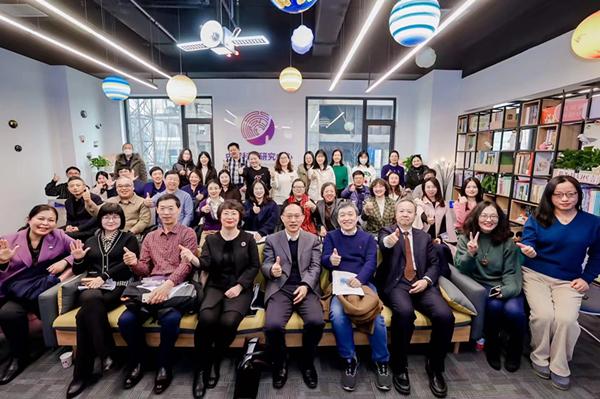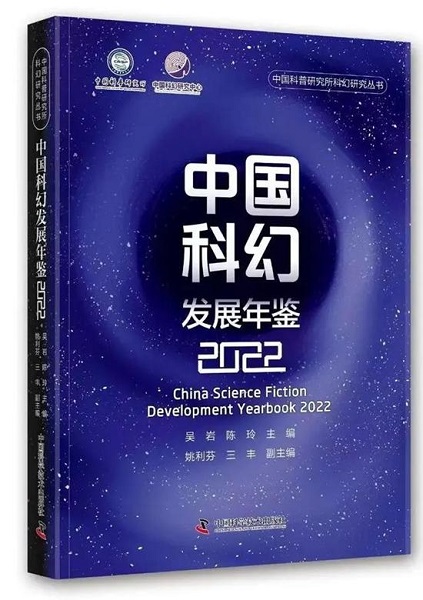
Sci-fi experts gather at the 2023 annual China Science Fiction Research Center conference in Beijing, Feb. 18, 2023. [Photo courtesy of China Science Fiction Research Center]
The report analyzes the development of the industry in four major areas: reading, film and television, games, and merchandise. It was compiled by the China Science Fiction Research Center, a Beijing-based sci-fi think tank established in 2020, and the Research Center for Science and Human Imagination at the Southern University of Science and Technology.
The sci-fi publishing industry generated overall revenue of 2.7 billion yuan, up 15.4% year on year, while digital reading revenue rose to 1.01 billion yuan, up 34.7% year on year.
Meanwhile, the sci-fi film and television industry saw total revenue of 7.19 billion yuan, up 171.4% year on year, and the sci-fi game industry saw revenue of 67 billion yuan, up 39.6% year on year. The most impressive growth, however, was in the sci-fi derivative products industry, which achieved total revenue of 6.07 billion yuan, up 186.3% year on year.
"The level of accumulation, development, and transformation of original Chinese sci-fi intellectual properties continues to improve, and the market share keeps increasing," remarked Wu Yan, a sci-fi writer, scholar, professor, and director of the Research Center for Science and Human Imagination at the Southern University of Science and Technology. Wu led the team responsible for compiling the report.
He pointed out that original domestic sci-fi merchandise manufacturing and sales revenue reached 2.55 billion yuan, up 20.2% year on year.
The report also highlights the growing interest in science fiction-based cultural tourism projects as the industry undergoes structural changes and adjustments. It suggests that the performance of the sci-fi tourism industry is an area worth monitoring.
"Nowadays, sci-fi-related policies and awards have been successively launched and implemented, various film and television works and videos have been released, and the wave of the Metaverse continues to generate heat, all of which are bringing opportunities and confidence for the development of China's sci-fi industry," Wu said.
"The current sci-fi literary ecosystem in China has never been better," he observed, with the Chinese Nebula Awards, co-founded by Wu, being one sign of that growth. The industry has been buoyed by government support, increased public interest, and intellectual contributions.
Wu emphasized that the development of science fiction literature relies on three crucial factors: the government, intellectual elites, and readers.
"In China's sci-fi development, these three factors are working in concert, and everyone believes that sci-fi is a very important literary branch now," Wu said. "Scientists, writers, journalists, students, entrepreneurs and others from various industries are writing sci-fi, and the number of people doing so is constantly increasing, indicating a thriving scene. In foreign sci-fi, content related to China is also increasing."
Wu also co-edited the annual China Science Fiction Development Yearbook, which was also released at the conference. According to the yearbook, China had approximately 132 sci-fi works translated and published abroad for the first time or re-released in 2021. This indicates an increasing number of foreign publishers helping to promote Chinese sci-fi.

The China Science Fiction Development Yearbook 2022. [Image courtesy of China Science and Technology Press]
Despite the positive developments in China's science fiction industry, experts have raised concerns about its overreliance on a few authors and lack of diversity in its offerings. Wu worries that despite the apparent excitement around Chinese sci-fi, the only author with a significant impact beyond China's borders is Liu Cixin. He emphasizes the need for more sci-fi writers in China, urging people to explore, discover, and support a broader range of science fiction.
Wu is very optimistic about China's sci-fi industry prospects in 2023. "At the beginning of this year, we had the 'Three-Body' TV series, the epic film 'The Wandering Earth 2,' and the import of 'Avatar: The Way of Water,' which all had phenomenal success in China, accompanied by their merchandise. Later this year, the Chinese sci-fi world will see more development, including the upcoming 81st World Science Fiction Convention (Worldcon) in Chengdu in October. This will certainly boost and improve the Chinese sci-fi industry."
The research center also unveiled its list of young scholars and talents at the conference. The list includes 50 young sci-fi scholars from China and abroad, comprising young university teachers and postgraduate students. The initiative encourages and guides young people to study the interaction between sci-fi and technology, the economy, society, and cultural development.
At the conference, expert representatives such as Yao Haijun, deputy editor-in-chief of Science Fiction World magazine, Wang Yuping, former deputy director general of the China Research Institute for Science Popularization, Fei Jun, a professor at the School of Design of the China Central Academy of Fine Arts, and Yang Feng, founder and CEO of Chinese sci-fi brand Eight Light Minutes Culture, discussed and exchanged ideas on various topics. These included preparations for Chengdu Worldcon 2023, the intersection of ChatGPT and science fiction, mixed-genre narratives, and the first volume of the new book series titled "Chinese Science Fiction: An Oral History."